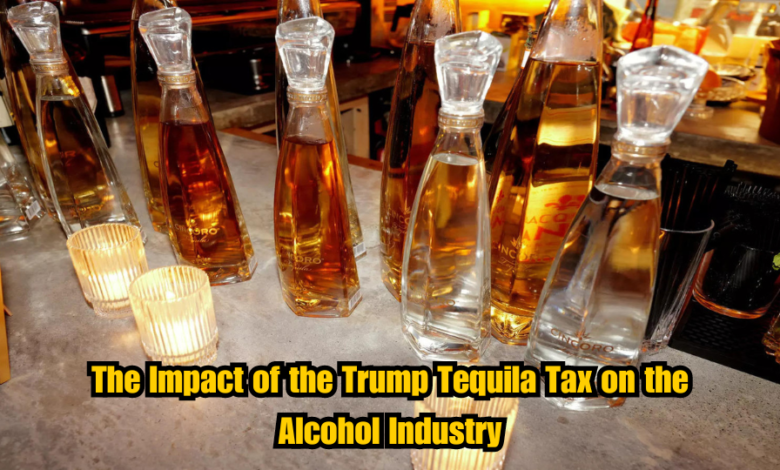The Impact of the Trump Tequila Tax on the Alcohol Industry

The Trump Tequila Tax refers to the specific tariffs and taxes introduced during the Trump administration, aimed at various Mexican products, including alcoholic beverages such as tequila. Given tequila’s prominence in the U.S. alcohol market and its cultural significance, this tax has had notable repercussions. This article delves into the multifaceted impact of the tequila tax on the alcohol industry, highlighting the economic, trade, and consumer implications.
Background: Why the Trump Tequila Tax Came into Existence
The Trump administration’s decision to impose tariffs on Mexican imports was part of a broader trade strategy aimed at renegotiating NAFTA and ensuring that Mexico bore part of the cost for heightened border security. As a response, the U.S. levied a range of taxes on products, with tequila emerging as a significant target due to its growing consumption and profitability in the U.S. market.
How the Tequila Tax Was Structured
The tariff was designed in multiple tiers, based on the alcohol content and origin of the product. High-end tequilas, often aged and produced in smaller batches, faced higher taxes, while mass-produced variants were less affected. This policy led to a varied impact across the tequila industry, hurting boutique distilleries more than large-scale producers.
Economic Impact: How the Trump Tequila Tax Shook the Industry
Price Surge and Consumer Behavior
The immediate effect of the tequila tax was a rise in retail prices across the U.S. market. On average, consumers saw a 10-15% increase in tequila prices, with premium brands like Don Julio and Patrón experiencing even steeper hikes. This led to shifts in consumer behavior, with many switching to cheaper alternatives like mezcal or domestic spirits such as bourbon.
Impact on U.S. Importers and Distributors
U.S.-based tequila importers and distributors were hit hard, as the higher prices squeezed profit margins. Many smaller importers struggled to remain competitive, leading to consolidation within the industry. Large importers, however, were able to mitigate some of the losses by leveraging economies of scale and renegotiating contracts with Mexican suppliers.
Effect on Mexican Producers
For Mexican producers, the tariffs disrupted a lucrative export market. Many smaller distilleries, which relied heavily on U.S. sales, faced the threat of closure or were forced to sell to larger conglomerates. The Trump Tequila Tax inadvertently accelerated industry consolidation in Mexico, with major players like Jose Cuervo and Sauza absorbing many smaller brands.
Political and Trade Implications of the Trump Tequila Tax
U.S.-Mexico Trade Relations
The tequila tax was not an isolated policy; it was part of a broader renegotiation of trade terms between the U.S. and Mexico. The tariffs led to tensions between the two nations, complicating negotiations for the USMCA (United States-Mexico-Canada Agreement), which replaced NAFTA in 2020. Mexican officials viewed the tax as punitive and retaliated by imposing similar taxes on U.S. whiskey and other goods, leading to a brief but intense trade war.
Impact on Global Trade Dynamics
The Trump Tequila Tax also had a ripple effect on global trade. Countries observing the U.S.-Mexico standoff began reconsidering their own trade policies, wary of similar actions against their exports. This added a layer of uncertainty in global markets, affecting the overall flow of goods and trade negotiations.
Consumer Reactions: How Did Americans Respond to the Tequila Tax?
Shifts in Purchasing Patterns
The increased prices made premium tequilas less accessible to the average consumer, pushing many toward cheaper brands or other spirits. There was a notable rise in mezcal sales, which saw a 20% growth in the year following the tax. Similarly, some consumers turned to craft spirits, as the allure of exclusivity became a key selling point against higher-priced tequilas.
The Rise of Counterfeit Tequilas
With legitimate tequilas becoming more expensive, counterfeit and black-market tequilas began to surface. Reports indicated a 30% spike in counterfeit tequila sales in states like California and Texas, where tequila is a staple. This not only posed a health risk to consumers but also hurt the reputation of legitimate producers.
Business Strategies: How Companies Adapted to the Trump Tequila Tax
Repackaging and Rebranding
To counter the negative effects of the tariff, many producers and importers resorted to repackaging their products. By modifying bottle sizes or altering the alcohol content, companies found ways to reduce taxable quantities and maintain competitive pricing. For instance, some brands introduced half-bottle variants, which offered consumers a lower price point while preserving margins.
Local Production Initiatives
Several companies took a more drastic approach by exploring the possibility of setting up production facilities in the U.S. Though not tequila by legal definition—due to strict Denomination of Origin rules—these products were marketed as “agave spirits,” mimicking the taste and profile of tequila. This trend gained traction, with three new agave spirit distilleries opening in Texas in 2021 alone.
Long-Term Impacts: What the Future Holds for the Tequila Industry
Normalization of Prices Post-Trump Era
The Biden administration has largely rolled back many of the Trump-era tariffs, but the tequila industry has been slow to revert to pre-tax pricing. The pandemic-induced supply chain issues have also contributed to lingering high prices. Experts predict it will take another 2-3 years for the market to stabilize fully.
Increased Focus on Premium and Super-Premium Categories
While the Trump Tequila Tax initially hurt premium tequila brands, it also spurred a resurgence in the super-premium category. As consumers became accustomed to higher prices, demand for ultra-high-end tequilas surged, with brands like Clase Azul and Casa Dragones seeing double-digit growth. This trend is expected to continue, with luxury tequilas becoming a permanent fixture in the market.
Economic and Social Impact on Mexico
Job Losses and Industry Consolidation
The Trump Tequila Tax had a profound impact on Mexico’s Jalisco region, the heartland of tequila production. Thousands of jobs were lost as smaller distilleries either closed or were absorbed by larger companies. This has led to growing concerns about the monopolization of the industry, as the top five companies now control over 70% of the market.
Community and Cultural Implications
Beyond the economic toll, the tequila tax also affected the cultural fabric of Mexico. Many family-owned distilleries, which have been in operation for generations, were forced to shut down. This loss is not just economic but cultural, as tequila production is deeply intertwined with Mexican heritage and identity.
A Look at the Current Market: The Post-Tariff Landscape in 2024
Recovery and Market Trends
As of September 2024, the tequila market is showing signs of recovery, though the scars of the Trump Tequila Tax are still visible. There has been a rise in direct-to-consumer sales, with online platforms like Drizly and ReserveBar seeing a 50% increase in tequila sales compared to 2020. This shift has prompted many brands to invest heavily in e-commerce and digital marketing.
Sustainability and Innovation
The prolonged impact of the tax has pushed many companies to rethink their supply chains and production methods. Sustainability has emerged as a key focus, with brands like Tequila Ocho and Fortaleza adopting more eco-friendly production practices. There is also a growing interest in organic tequilas, which are seen as a way to attract the health-conscious millennial and Gen-Z demographics.
Conclusion: The Legacy of the Trump Tequila Tax
The Trump Tequila Tax was a turning point for the industry, reshaping both the business landscape and consumer preferences. While the initial effects were negative—leading to price increases, industry consolidation, and job losses—the industry has adapted. By focusing on premiumization, innovation, and sustainability, the tequila sector is poised for long-term growth. The Trump Tequila Tax, though temporary, will have lasting impacts on how tequila is produced, marketed, and consumed in the U.S.
For a deeper understanding of how U.S. tariffs affect other industries, visit this resource on trade policies and their economic implications.
Moreover, for insights on the broader trade dynamics between the U.S. and Mexico, refer to the USMCA Agreement for detailed documentation and trade stipulations.
This comprehensive analysis serves as a testament to the resilience and adaptability of the tequila industry. As we move forward, understanding the historical context and evolving trends will be crucial for stakeholders and consumers alike.




